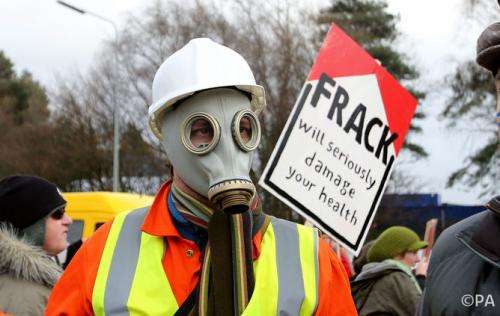Fracking health risks must be established now, before the industry grows

The Shale UK Summit conference is underway in London, bringing together geological, petroleum, engineering and energy economics experts. Despite all this expertise, and although much of the fracking technology used to extract the gas from shale rock is well established, there are still a large number of unknowns surrounding fracking, including the potential effects on health.
Fracking is still at a very early stage in the UK, with only one exploratory well drilled so far. This provides an important opportunity for scientists to gather information and study the health and environmental effects before any large-scale developments take place.
Despite the unconventional oil and gas industry growing rapidly in the US, and gathering momentum elsewhere across the world, scientific study of the health effects of fracking is in its infancy. Yet early findings suggest this form of extraction might increase health risks compared to conventional oil and gas wells. The fracking drilling sites have larger surface footprints, and may be (certainly in the UK) much closer to where people live. The need to transport and store large volumes of toxic chemicals and contaminated water are likely to pose negative consequences for health.
Research in the US, where 65,000 shale gas wells have been drilled, suggests the risk of environmental contamination is present at all stages of extraction. These include surface spills and leakages, emissions from gas-processing equipment, and pollution from the large numbers of heavy transport vehicles involved. There is therefore ample opportunity for pollutants to contaminate the air, and ground and surface water.
What about those working on the wells? While the toxicological data for the chemicals injected into wells (the fracking fluid) indicate that many of them have known adverse effects on health, there are some for which no toxicological data exists. Making a full assessment of potential risks to health has been difficult in the US because drilling operators are not required to disclose which chemicals are used. Thankfully, the UK Government has accepted the recommendations of the Royal Society and Royal Academy of Engineering Working Group on shale gas extraction by requiring companies to disclosure the chemicals they use.
But detailed studies are needed along the entire shale gas supply chain in order to understand potential health issues. The socioeconomic implications of shale gas development on local communities before, during, and after extraction, and how risks should be communicated and minimised, are especially important tasks that need to be tackled.
In addition to local threats to health and environment, another key consideration is the contribution of shale gas to climate change. There is conflicting evidence about whether fracking produces more or less greenhouse gas emissions than coal. In any case, the evidence from the US is that shale gas has developed alongside the use of coal, rather than replacing it, leading to an overall increase in greenhouse gas emissions.
When considering the viability of fracking, it will be important for health impact assessments to include the long term implications of waste disposal, fugitive methane emissions escaping from the ground or the well, and other implications for human health – not just analyses of the environmental and public health risks during active development. With a technically challenging and global industry it's vitally important that data and expertise is readily shared.
In coming decades, climate policies and declining fuel reserves will probably drive substantial changes in energy policy. As the development of shale gas plays into questions of alternative sources of energy it can provide a good case study into the challenges ahead. What is important is that all the potential risks – immediate and for the long term – are established quickly so that policy and regulation can be made fit for purpose.
Provided by The Conversation
This story is published courtesy of The Conversation (under Creative Commons-Attribution/No derivatives).![]()

















